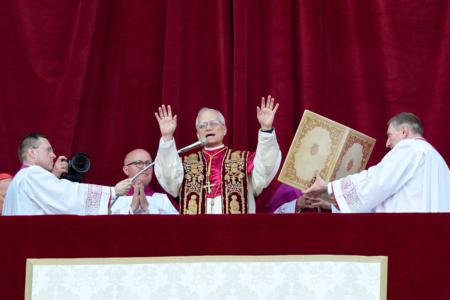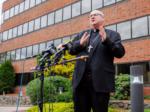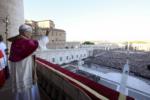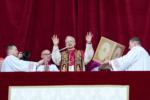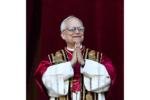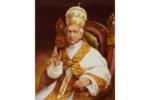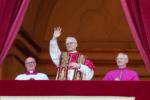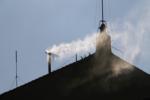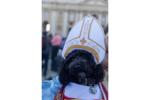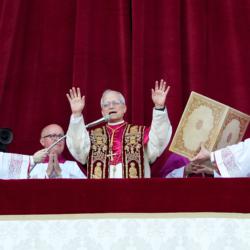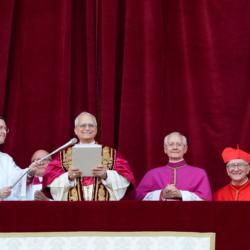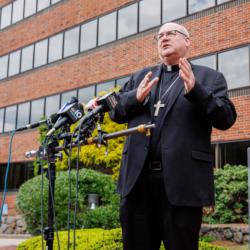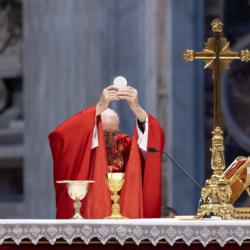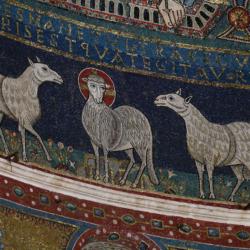Panelists say late pope will be remembered as great theologian, thinker
WASHINGTON (OSV News) -- Pope Benedict XVI will be remembered as one of the Catholic Church's greatest theologians, said a former U.S. ambassador to the Holy See in a Jan. 5 online roundtable on the late pope's legacy.
Pope Benedict XVI was "a theologian who had an unusual ability to communicate to all sorts of audiences, and I think that will last for as long as the church looks at learned and faithful men to help us understand the times we live in," said Mary Ann Glendon, a Harvard Law School professor emerita who represented the U.S. before the Holy See from 2008-2009.
The late pope's legacy also encompasses the years before he became pope, she added, in particular his role "as a leading thinker" during the Second Vatican Council and as "someone who throughout his life attempted to carry forward the challenge of Vatican II, which was to bring the message of Jesus Christ, our Lord and Savior, to a world that is increasingly de-Christianized."
Joining Glendon for the virtual roundtable were Francis X. Maier, senior fellow in Catholic studies at the Washington-based Ethics and Public Policy Center, and Jesuit Father Joseph Fessio, editor-in-chief of Ignatius Press in San Francisco and a personal friend of the pope who died Dec. 31 at age 95.
The roundtable was hosted by National Review in partnership with Catholic World Report, Ethics and Public Policy Center and Ignatius Press.
It was moderated by Kathryn Jean Lopez, senior fellow at National Review Institute, where she directs the Center for Religion, Culture and Civil Society and is editor-at-large of National Review.
Maier said Pope Benedict "made hope believable precisely because he lived through an extremely difficult time and emerged on the other end of it more deeply faithful ... and more convicted about his faith."
"(He) went through this furnace of the Second World War and the atheist theologies (of that time), which gave people plenty of reason to despair, and he never did," Maier said. "He came out of that with a renewed hope and an absolute confidence in Jesus Christ. ... I find that an enormously persuasive argument for the truth of Christianity."
Maier recalled "two wonderful conversations" he had with the future pope in the 1980s – when Maier served as editor-in-chief of the National Catholic Register. Then-Cardinal Ratzinger had an "extraordinary mind," Maier said. "It was one of the graces of my life to have any contact with him at all."
Maier also noted how "he saw where we are now" as a church decades ago in his radio talks of 1969 and 1970.
"The future of the church can and will issue from those whose roots are deep and who live from the pure fullness of their faith," said then-Father Ratzinger. "It will not issue from those who accommodate themselves merely to the passing moment or from those who merely criticize others and assume that they themselves are infallible measuring rods."
Maier also shared an observation about Pope Benedict from retired Archbishop Charles J. Chaput, whom Maier previously served as senior adviser and special assistant for 23 years when the archbishop headed the Denver Archdiocese and later the Philadelphia Archdiocese.
"The archbishop said there are two couplets to remember" about the German pontiff, Maier explained. "One is faith and reason and the other is realism and hope. (In his writings) there's a profound realism about the hardship that the Christian life can be in the world but also hope."
Another quality Maier admired about Pope Benedict "was his fidelity."
"He constantly wanted to go back to Germany and Wojtyla (St. John Paul II) wouldn't let him -- he just quietly did his job with extraordinary ability," Maier added. As Cardinal Joseph Ratzinger, the future Pope Benedict was the Vatican's chief doctrinal official under the Polish pope.
Father Fessio first met then-Father Ratzinger in the early 1970s, while he was pursuing a doctorate in theology at the University of Regensburg, in what was then West Germany. His thesis, "The Ecclesiology of Hans Urs von Balthasar," was directed by Father Ratzinger, his professor and mentor.
"I learned very soon he was a brilliant teacher and theologian. ... He was always trying to find the truth. He was really a truthseeker," the Jesuit said. "And contrary to the public image" some have of him, he was gentle, kind, warm and gracious – and he listened, the priest added.
When he returned to the United States after his studies, Father Fessio founded Ignatius Press in 1978 to publish in English the theological works of his teacher and mentor as well as the works of other contemporary theologians.
Ignatius has published about 40 books written by Cardinal Ratzinger/ Pope Benedict and remains the primary publisher of his works.
"That's a great blessing for us," the priest said.
Glendon noted she met Pope Benedict for the first time when she was president of the Pontifical Academy of Social Sciences; she served in that role from 2004-2014.
She praised the pope for advancing women in the church. "It wasn't just being comfortable with women theologians and women leaders in the church," she said. Pope Benedict also took "certain steps that were truly remarkable" to advance women, she continued. For example, at his urging, L'Osservatore Romano, the Vatican newspaper, hired its first woman reporter in 2012, according to Glendon.
Asked about some of the highlights of Pope Benedict's pastoral visit to the U.S. in 2008, Glendon said it was "a whirlwind performance. …
